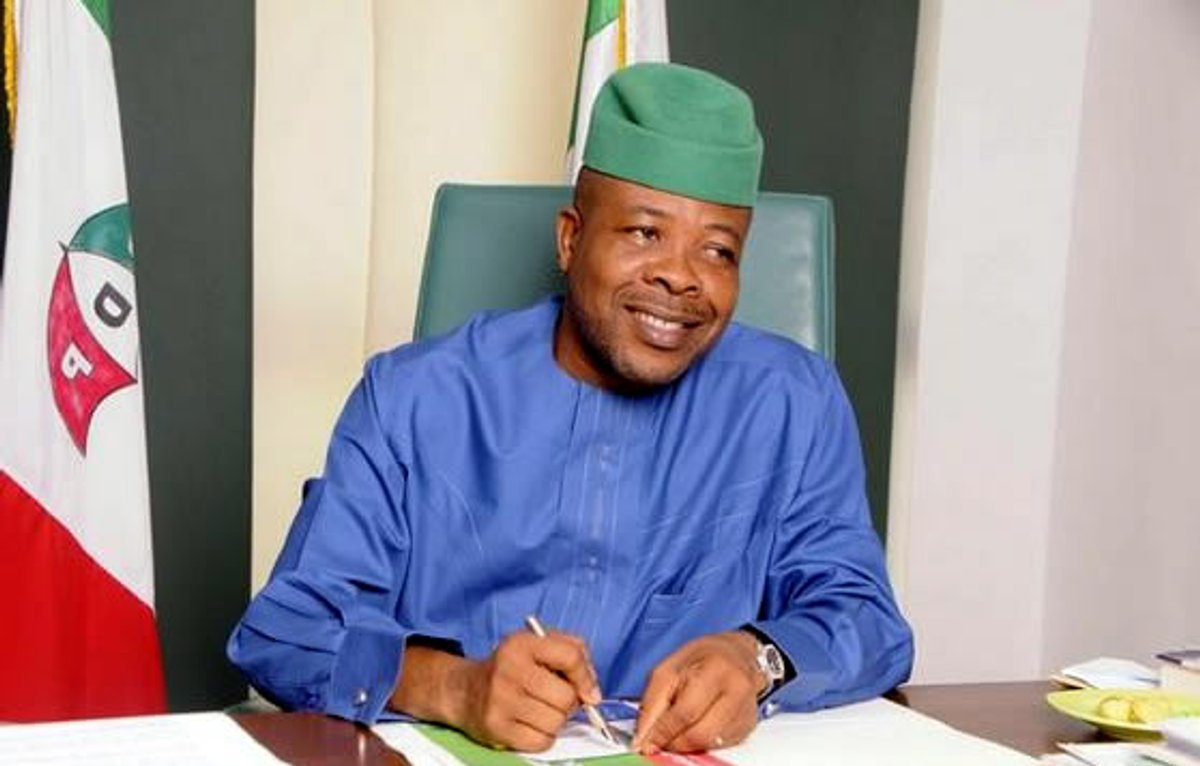Following days of speculation, the former governor of Imo State, Emeka Ihedioha, has finally returned to the Supreme Court to challenge the January 14 judgment which removed him as governor and declared Hope Uzodinma as the elected governor.
The fresh application dated February 5, 2020 and brought by his counsel and former Attorney General of the Federation and Minister of Justice, Kanu Agabi (SAN) is praying the apex court “to set aside the judgment delivered by this honourable court on the 14th of January 2020 in Appeal No. SC. 1462/2019 and Cross Appeal No. SC. 1470/2019.”
The fresh application is brought under Section 6(6) of the Nigerian Constitution 1999 and Section 22 of the Supreme Court Act, 2004.
A seven-member justices had unanimously ruled that Uzodinma, who is of the APC, proved the allegation of unlawful exclusion of results in 388 polling units of the state where he scored 213,695 votes.
The lead judgment read by Justice Kudirat Kekere-Ekun, held that the Court of Appeal was wrong to have ruled that the PW54, subpoenaed police deputy commissioner, who produced the documents of the results, was not the proper person to tender same as he was not at the polling units.
Ihedioha of the PDP had polled 273,404 votes for the election in 27 local government areas of the state; Action Alliance candidate, Uche Nwosu, polled 190,364 votes and APGA’s Ifeanyi Ararume polled 114,676 votes. With the addition of the excluded votes, Uzodinma’s votes now rose to 310,153.
Why we returned to court
This time around, Ihedioha has listed five grounds bordering on non-dismissal of the subsisting judgment declaring the petition incompetent, lack of jurisdiction, fraud, error, and deception.
One of the lawyers familiar with the matter stated, on the condition of anonymity, that a date for hearing will be fixed as soon as the period for service and exchange of briefs of argument between the parties in the matter is concluded.
Counsel to Uzodinma, Damian Dodo (SAN), did not respond to calls and text messages to his line. But another lawyer in the matter, Festus Jombo Esq, said, “when we see the application, we will look at it from our own perspective and see how we respond at the court.”
Subsisting judgement of Court of Appeal
Ihedioha argues that the Court of Appeal had struck out Uzodinma’s petition earlier and that the decision was still subsisting at the time the Supreme Court decided the substantive appeal. He explained that it had applied for the petition to be struck out on the ground that it was incompetent because Uzodinma who came fourth in the election did not join Nwosu and Ararume who came second and third.
“In the absence of any specific order of the Supreme Court setting aside the order of the Court of Appeal striking out the petition, the Supreme Court had no jurisdiction to countenance the appellant’s appeal,” he said.
Judgement delivered without jurisdiction
Ihedioha is further contending that the Supreme Court had no jurisdiction, under Section 140 (2) of the Electoral Act, to declare Uzodinma as the winner of the election of March 9, 2019 by “branding or stigmatizing the entire election as invalid.”
He argued further that the election petition was based on two inconsistent and mutually exclusive grounds, “to wit, i) that the 1st Applicant was not duly elected by majority of lawful votes cast at the election, the implication of which is that the majority of votes cast at the election were valid, and ii) that the election was invalid for non-compliance with the Electoral Act, the implication of which is that the election be annulled.”
Judgment obtained by fraud or deceit
Ihedioha and PDP are also alleging that Uzodinma and APC fraudulently misled the court into holding that a total of 213,495 votes were unlawfully excluded from the votes he scored in the March 9, 2019 election.
“The fraudulent nature of the additional votes was demonstrated by the fact that the total votes cast as shown in the 1st appellant/respondent (Uzodinma)’s computation was more than the total number of voters accredited for the election and in some polling units more than the total number of registered voters,” he averred.
Judgment given per incuriam (delivered without considering existing laws)
Ihedioha and PDP are also contending that the total number of voters accredited for the governorship election on 9th March, 2019 was 823,743, while the total valid voted cast was 731,485.
They said with the inclusion of 213,695 votes of Uzodinma as ordered by the court, “the total number of votes cast at the election now stands at 953,083 (i.e. 731485+213695+1903) making the total number of votes cast at the election to be far in excess of the total number of voters accredited for the election, 129, 340.”
Court misled to enter judgement
Ihedioha and PDP argue that while Uzodinma alleged that votes in 388 polling units were unlawfully excluded or canceled and urged the court to include them, he also asked the court to order fresh election to be conducted in the said polling units “thus rendering the petition speculative.” They added that Uzodinma failed to plead votes scored by all the parties in the 388 affected polling units.

 Join Daily Trust WhatsApp Community For Quick Access To News and Happenings Around You.
Join Daily Trust WhatsApp Community For Quick Access To News and Happenings Around You.



